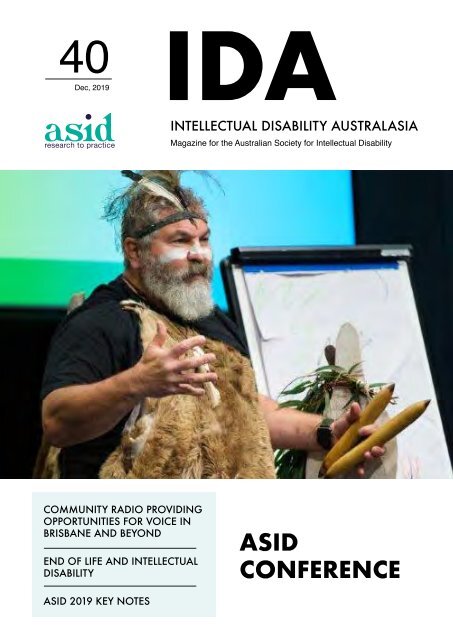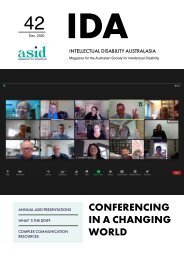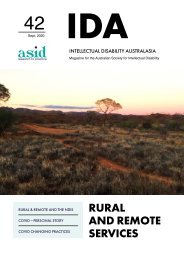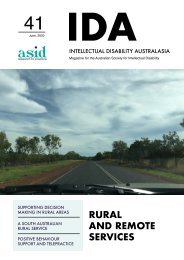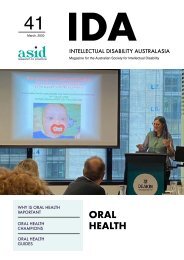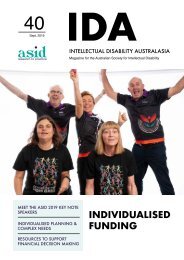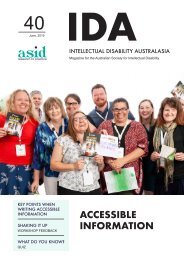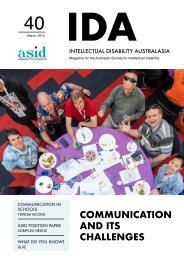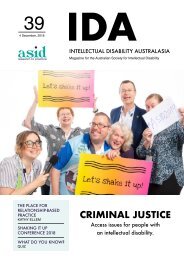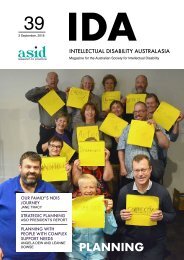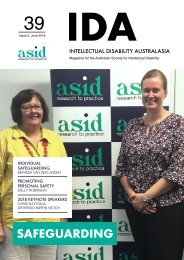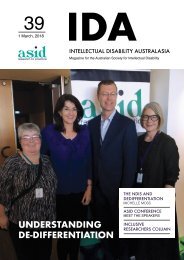IDA Vol 40 Issue 4 - ASID (Dec 2019)
You also want an ePaper? Increase the reach of your titles
YUMPU automatically turns print PDFs into web optimized ePapers that Google loves.
<strong>40</strong><br />
<strong>Dec</strong>, <strong>2019</strong><br />
<strong>IDA</strong><br />
INTELLECTUAL DISABILITY AUSTRALASIA<br />
Magazine for the Australian Society for Intellectual Disability<br />
COMMUNITY RADIO PROVIDING<br />
OPPORTUNITIES FOR VOICE IN<br />
BRISBANE AND BEYOND<br />
END OF LIFE AND INTELLECTUAL<br />
DISABILITY<br />
<strong>ASID</strong><br />
CONFERENCE<br />
<strong>ASID</strong> <strong>2019</strong> KEY NOTES
Welcome to the <strong>Dec</strong>ember<br />
edition of <strong>IDA</strong> Magazine<br />
Frances Hartnett<br />
<strong>ASID</strong>-ANZ Division Member<br />
Debbie Espiner<br />
<strong>ASID</strong>-ANZ Division Member<br />
It has been a pleasure putting this last edition for the year<br />
together. Co-editing highlighted the varied and important<br />
contribution <strong>ASID</strong> makes to the field of intellectual disability.<br />
Thank you to everyone who contributed to the <strong>Dec</strong>ember issue<br />
of <strong>IDA</strong>.<br />
Congratulations to the South Australian Division for<br />
organising and running a most successful conference. The<br />
feedback and the photos you will see in this issue (Page 16)<br />
demonstrate the importance of new ideas and insights, of<br />
applying research to practice, of connecting and reconnecting,<br />
and taking control on the journey to a good life. We are<br />
hoping to continue this journey and replicate the positive<br />
energy in Aotearoa New Zealand, 4-6 November 2020 in<br />
Auckland. The theme of the 2020 Australasian conference,<br />
Whanaungatanga – Growing Connections throws light on the<br />
importance of connections. Our intention is that through shared<br />
experiences, learning from and being with one another, a<br />
sense of belonging, whanaungatanga will prevail.<br />
We hope you will enjoy this issue and continue your<br />
connection with and contribution to <strong>ASID</strong>.<br />
Frances Hartnett and Debbie Espiner<br />
<strong>ASID</strong>-ANZ Division members<br />
• idaeditor@asid.asn.au<br />
2 www.asid.asn.au
VOLUME <strong>40</strong>, ISSUE 4, DECEMBER <strong>2019</strong><br />
Contents<br />
President’s Report 4<br />
Community Radio Providing Opportunities<br />
For Voice In Brisbane and Beyond 6<br />
End Of Life and Intellectual Disability 11<br />
Division Report 12<br />
South Australia 12<br />
Western Australia 13<br />
Victoria 13<br />
Aotearoa, New Zealand 14<br />
Board Member Profile 16<br />
Meet John Grant 16<br />
Reflections On <strong>ASID</strong> <strong>2019</strong> Conference 17<br />
What Receiving An Award Means 22<br />
Quiz 24<br />
Events 26<br />
Why Join <strong>ASID</strong> 27<br />
<strong>ASID</strong> Committees 29<br />
Writing An Article For <strong>IDA</strong> 30<br />
Why Advertise In <strong>IDA</strong>? 31<br />
Cover Image:<br />
Michael O’Brien, Welcome to the Country at <strong>ASID</strong> <strong>2019</strong><br />
<strong>Vol</strong> <strong>40</strong>, <strong>Issue</strong> 4, <strong>Dec</strong>ember <strong>2019</strong><br />
3
PRESIDENT’S REPORT<br />
It has been a pleasure to lead <strong>ASID</strong> through another year. As an organisation, we have stayed true to our<br />
commitment to be a peak body across Australia and Aotearoa New Zealand for research to practice in<br />
intellectual disability. We have taken new steps to grow our capacity to connect with people using innovative<br />
methods, including technology. A significant challenge to our capacity and responsiveness from the sector<br />
continues to be the unprecedented disability sector reforms in both Australia and Aotearoa New Zealand.<br />
A summary of some of our activities across the year includes:<br />
Strategic Direction:<br />
The <strong>ASID</strong> Strategic Plan is up for review in 2020. In anticipation of this, the Board has invested<br />
substantial time and energy across <strong>2019</strong> into discussing <strong>ASID</strong>’s future strategic and operational<br />
directions. Our approach must take into consideration the need for <strong>ASID</strong> to be agile and responsive<br />
within a rapidly changing sector.<br />
Influence:<br />
Throughout the year <strong>ASID</strong> Ltd has made several representations on matters relating to intellectual<br />
disability across Australasia. This included the treatment of people with intellectual disability facing<br />
involvement in the judicial and mental health system in Aotearoa New Zealand and the Royal<br />
Commission into Violence, Abuse, Neglect and Exploitation of People with Disability in Australia.<br />
Earlier in <strong>2019</strong> we supported an Australian federal election bid seeking national action on the health<br />
inequalities experienced by people with intellectual disability. We also supported the NSW Council for<br />
Intellectual Disability successful #HardToSwallow campaign, advocating for swallowing assessments<br />
and therapy for people with disability under the National Disability Insurance Scheme.<br />
On 16 May <strong>2019</strong>, <strong>ASID</strong> launched our new Position Statement ‘Intellectual Disability & Complex Support<br />
Needs’, via an event in Sydney, NSW. The Position Statement was subsequently circulated to the<br />
Federal Minister and Opposition spokesperson for Disability together with State Ministers and Opposition<br />
Spokespeople for Disability.<br />
<strong>ASID</strong> has since commenced a scoping review of available current evidence-based position statements<br />
and information/fact sheets that aim to enhance the lives of people with intellectual disability living in<br />
Aotearoa New Zealand and Australia.<br />
Tenders & Contracts:<br />
In 2018 we appointed Conference Design as our ongoing Professional Conference Organisers for an<br />
initial contract of three years. We look forward to working with Conference Design in the coming years<br />
on our Australasian conference.<br />
4 www.asid.asn.au
PRESIDENT’S REPORT<br />
Communication:<br />
Over the past 12 months we have invested energies into our social<br />
media presence. We have seen our efforts pay off with a significant<br />
increase to our followers and engagement with our posts.<br />
Feedback on our webinar and podcast seasons have been incredibly<br />
positive. In response we have continued with these platforms. We are<br />
now midway through Season 2 of the <strong>ASID</strong> webinars and planning for<br />
Season 3 podcasts is underway.<br />
<strong>2019</strong> Conference – The Journey To A Good Life,<br />
<strong>2019</strong> <strong>ASID</strong> President<br />
Taking Control<br />
president@asid.asn.au<br />
From the 6-8th November, more than 300 delegates came together<br />
to debate, discuss and collaborate on how we achieve a good life for<br />
people with intellectual disability. The program was a great success and we owe a debt of gratitude to<br />
Denice Whardall and Ian Pearce (Co-Convenors), along with the local organising committee. Thanks<br />
also to Professor Christine Bigby for leading the conference scientific committee.<br />
There will be lots of reports in this <strong>IDA</strong> about the conference.<br />
Change in Board Directors:<br />
Over the past 12 months we’ve had three Board Directors resign from their positions. Sharon Brandford<br />
(Aotearoa New Zealand), Sophia Tipping (Victoria) and David Treanor (Tasmania).<br />
I would like to take a moment to acknowledge the significant and lengthy contribution Sharon made as a<br />
Board Director. Her depth of knowledge and experience is greatly missed by our Board. We are fortunate<br />
that she remains actively involved in Aotearoa New Zealand and as a member of the Board Events<br />
Committee. I’m grateful in knowing she’s only an email away and will continue to support the work of <strong>ASID</strong>.<br />
With three resignations we welcomed two new Board Directors into casual vacancies – Dr Brigit Mirfin-<br />
Veitch (Aotearoa New Zealand) and Associate Professor Angela Dew (Victoria). We also welcomed back<br />
Darryleen Wiggins (Tasmania).<br />
With thanks:<br />
Laura Hogan<br />
The above is a small snapshot of some of our activities over the past 12 months. I am fortunate to<br />
work amongst an innovative and committed team. A sincere thank you to the <strong>ASID</strong> Board of Directors<br />
– Professor Angus Buchanan (Vice President & Chair Journal Committee), Ben Crothers (Treasurer &<br />
Chair Finance Committee), Dr Allyson Thomson (Secretary & Chair Membership Committee),<br />
Bernadette Curryer (Chair Strategic Partnerships and Relationships Committee), Professor Christine<br />
Bigby (RAPIDD Editor), Denice Wharldall (<strong>2019</strong> Conference Co-Convenor), Morrie O’Connor, Paul<br />
O’Dea, Ruth Firstbrook, Debbie Espiner, Dr Brigit Mirfin-Veitch, Associate Professor Angela Dew and<br />
Darryleen Wiggins.<br />
I also offer my thanks to Board Member, Dr Hilary Johnson (Chair Communications Committee & <strong>IDA</strong><br />
Editor).<br />
Our capacity to achieve our goals is supported and progressed by our wonderful Executive Officer,<br />
Dee Sidhu. Thank you also to Sue Salisbury for her ongoing patience and assistance to <strong>ASID</strong> as our<br />
Secretariat.<br />
<strong>Vol</strong> <strong>40</strong>, <strong>Issue</strong> 4, <strong>Dec</strong>ember <strong>2019</strong><br />
5
COMMUNITY RADIO<br />
PROVIDING OPPORTUNITIES<br />
FOR VOICE IN<br />
BRISBANE AND BEYOND<br />
By Kim Stewart, Paul O’Dea and Michael Cherry<br />
Everybody has a right to participate in the democratic dialogue of our communities, to express their<br />
needs and shape cultural change. Participation in the media is one way that we can do this, however<br />
the mainstream media often do not value or encourage diversity and are not representative of broader<br />
society (Ellis, 2016). Participation in citizen media, which makes self-representation a priority, can be a<br />
remedy to both lack of participation and misrepresentation. Community radio in Australia was created<br />
for that purpose (Community Broadcasting Association of Australia, 2008). This article describes work<br />
and research, much of it done in collaboration with people with intellectual disability, that emphasizes<br />
the value of listening well to voices of people with disability and supporting them to reach a broadcast<br />
audience regardless of their skill or speech capacities.<br />
There is a need for self-representing voices of people with intellectual disability in the media. The<br />
mainstream media has a poor track record of representing people with disability, with people with<br />
intellectual disability mostly absent from both entertainment and news media stories (Ellis & Goggin,<br />
2015; Ellis, Kent, Hollier, Burns, & Goggin, 2018; Goggin, 2009). Zhang and Haller (2013) asked 359<br />
people with intellectual disability what they thought about how the media portrayed them. Respondents<br />
stated that media portrayals devalued them, leading the researchers to conclude that the predominance<br />
of negative media representations created a “disabling environment” that was a valid target for disability<br />
activists seeking to change public attitudes (p.329).<br />
Enhancing democratic participation, voice and agency is the thinking behind self-advocacy groups<br />
(Goodley & Armstrong, 2001). Developing a voice is also a source of confidence and empowerment<br />
(Anderson & Bigby, 2017), as people are able to express their experience in their own lives and develop<br />
the confidence that their stories are valid and that people want to listen to them. This thinking was the<br />
foundation of the Ability Radio Project, begun in 2015, a collaboration between Community Radio 4ZZZ<br />
and people with cognitive and physical disability living in Brisbane, Queensland. Kim Stewart, a social<br />
worker and radio producer and Ben Stimpson, a support worker and musician got together with a group<br />
with people with intellectual disability, including co-authors Paul O’Dea and Michael Cherry. Participants<br />
were involved with disability advocacy organisations including the Community Living Association and<br />
WWILD. Many had an interest in radio and self-advocacy, although some participated for their love<br />
of music and friendship. All the participants were people with cognitive differences with a story to tell.<br />
During the initial project, production was directed by the interests of the participants, and we all learnt<br />
6 www.asid.asn.au
COMMUNITY RADIO PROVIDING OPPORTUNITIES FOR VOICE IN BRISBANE AND BEYOND<br />
The Only Human team<br />
supporting people with<br />
disability to have a voice<br />
on 4ZZZ in Brisbane every<br />
week. Left to right Renee,<br />
Steve, Kim, MC Chosen and<br />
Madonna in 2018<br />
that our stories are valuable and important, and developed skills for interviewing others. Kim and Ben<br />
provided the technical know-how to record and create a radio series, the Voiceability series, that won<br />
the Tony Staley Award for Excellence in Community Broadcasting in 2015 (Radio Today, 2015). During<br />
that collaboration, the importance of listening to and drawing out the stories of others to authentically<br />
represent people’s experiences became a crucial learning for all of us.<br />
Since that first project Kim, coordinating the Ability Radio Project and as a trainer with the Community<br />
Media Training Organisation, has facilitated many groups that train and develop the voice of people with<br />
intellectual, learning and other disabilities and connected to others nation-wide, leading to her doctoral<br />
research published in <strong>2019</strong>. Two groups ran monthly recording sessions in 2016-18 and were named by<br />
the participants: The People of The Air, of which Paul and Michael were members; and the Whoopeedo<br />
Crew Radio Group. Other projects facilitated by Kim included Women On the Edge (2018), Home Truths<br />
(<strong>2019</strong>) and concurrently a weekly program Only Human on 4ZZZ which has provided many opportunities<br />
for media participation for people with disability and disability organisations, both in the studio and<br />
through outreach. In 2018, ARP participated in the International Day for Persons with a Disability<br />
broadcast on the Community Media Network, which resulted in the stories of people with intellectual<br />
disabilities reaching a large audience of 5.9 million Australians who listen to community radio weekly<br />
(McNair Yellow Squares, <strong>2019</strong>).<br />
Listening as a purposeful activity has been the basis of the facilitated story-making in these media<br />
projects. This is a fundamental difference to usual media practice that tends to listen only to tell the<br />
story the media-maker wants to tell, which may not align with that of the ‘talent’ (what journalists often<br />
call their interviewees). The assumption is that a willingness to listen “enacts political equality, by seeing<br />
and listening to others as interdependent equals” (Bassel, 2017. p. 86). According to Thill (2018) in<br />
her examination of using listening for social justice, voice requires the powerful to listen in order to<br />
have an effect on decision-making. According to Thill (2018) relations of oppression succeed “partly<br />
by subjugating the voices and knowledge claims of particular people and groups”, and by employing a<br />
“deficit discourse” about marginalised groups that is maintained by their purposeful absence in dialogue<br />
<strong>Vol</strong> <strong>40</strong>, <strong>Issue</strong> 4, <strong>Dec</strong>ember <strong>2019</strong><br />
7
COMMUNITY RADIO PROVIDING OPPORTUNITIES FOR VOICE IN BRISBANE AND BEYOND<br />
about them (p. 63). A commitment to understanding and representing accurately what we are told by<br />
people with disabilities about their lived experiences is both a social and political act of recognition,<br />
something many theorists agree upon (Bassel, 2017; Dreher, 2010; Dutta, 2014; Goggin, 2009; Lacey,<br />
2013; Pasupathi & Billitteri, 2015; Thill, 2018). Critical, mindful listening demonstrates respect for and<br />
solidarity with the teller’s experience (Bassel, 2017), and can form the basis of action for social justice<br />
(Thill, 2018). Listening assists disadvantaged groups find their political power (Dutta, 2014).<br />
In practice, by encouraging people to elaborate on the clues they give us about their interests,<br />
sometimes with the help of a support worker or parent, we have enabled participants to direct<br />
discussions. By listening well, we have been able to include the voices and words of people who may<br />
have little speech, who take time to express themselves, or who are unused to telling stories about<br />
their lives and interests. This coheres with the evidence of counselling practice, where Rogers’ notion<br />
of “unconditional positive regard” is a key to good listening and client-centred therapy (Rogers, 1951).<br />
For instance, Thill (2015) argues that people who participated in the “open listening” process of the<br />
NDIS scheme were listened to and their input incorporated into the final product. Open listening entails<br />
listening without judging or competing with or challenging the speaker in argument. Through such<br />
openness, both speaker and listener make meaning collaboratively. Listening then becomes a tool<br />
for challenging one’s own privilege. Describing the politics of listening to people with disabilities, (as<br />
conceived by Newell, late colleague of Goggin, 2009), explicitly recognises the power relations in political<br />
dialogues and the significance of being listened to as an expert in one’s own life, instead of being<br />
expected to listen to “experts” tell one what one wants or needs. Newell saw everyday interactions of<br />
listening as political-democratic practice in everyday life that challenged dominant narratives of disability.<br />
Kim’s doctoral research, conducted at the Queensland University of Technology, included 19 participants<br />
with disability, eight of whom had cognitive impairment or intellectual disability (Stewart, <strong>2019</strong>). For many<br />
of the participants with intellectual disability, their participation had been enabled by experienced media<br />
producers either as part of an external program (eg. Ability Radio Project and Making Airwaves, a similar<br />
project run in Sydney by the Windgap Foundation) or as participants in an existing radio programs,<br />
such as several with a disability<br />
focus on 3CR in Melbourne. For<br />
others who came to community<br />
radio stations independently,<br />
where a disability-specific<br />
program did not exist, they<br />
faced challenges in access to<br />
training and participation, and<br />
some said they felt their skills<br />
were underestimated or that<br />
non-disabled people at stations<br />
were sometimes gatekeepers<br />
that prevented their participation.<br />
Much work is yet to be done<br />
changing attitudes within the<br />
sector, as elsewhere.<br />
Paul and Michael, co-authors of<br />
this article, talked about the need<br />
Michael (left) and Paul (right) on a studio visit to the ABC with Mel (centre)<br />
and the People of the Air Radio group in 2017<br />
8 www.asid.asn.au
to change attitudes in society to allow their full participation:<br />
People just don’t want to give us a go, um, and that could be anything you know. It could be how we<br />
look, to how we talk, to how we go about doing things, I think. (Paul)<br />
I think they think that people with disabilities can’t do things, so they’re not gonna give them that time<br />
to try (Michael).<br />
Paul and Michael were regular participants in the first years of the Ability Radio Project and talk about<br />
the value of participating in the group and more broadly in the media, where they both agreed they did<br />
not often hear people like them:<br />
I think it would be easier if there were other people with disabilities who want to be on the radio as<br />
well. So we are not the only ones who’ve got a disability on the radio. There should be more people<br />
with disabilities on the radio, so they’ve got a voice on the radio as well. Than just us (Michael).<br />
Michael points to the need to change attitudes by increasing the presence of people with disability on-air,<br />
particularly valuing his capacity to help lift up others along with himself.<br />
Other participants in the research also expressed their enthusiasm for participation in community radio to<br />
enable others to have a voice. Scott Whelan, a school teacher who has cerebral palsy, has become the<br />
station manager at this suburban Adelaide station since the publication of the research he participated in.<br />
He says,<br />
Without getting all hippy and stuff, it’s a sense of satisfaction that I’m contributing to something<br />
worthwhile. …Community radio is like the people’s radio… and people with disabilities are part of<br />
people, there should be more of them. If they are out there and they want to have a go (Scott).<br />
Scott’s message resonates with the values of the community media sector that has long seen itself as ‘a<br />
voice for the voiceless’.<br />
Effective listening has a social change aspect that can redirect the effort of activism towards the<br />
“conventions, institutions and privileges which shape who and what can be heard in media” (Dreher,<br />
2010, p. 85). While disability activism is a powerful way to raise awareness, Dreher and Mondal (2018)<br />
suggest that inequity can only be addressed when the powerful also work to address their privilege and<br />
meaningfully dialogue with the powerless “on their own terms rather than on the terms dictated to them<br />
by established elites” (p. 10). As in other parts of the community, formal and informal hierarchical power<br />
imbalances exist in community media. However, it is social justice principles make this sector ripe for<br />
social change towards more inclusivity.<br />
There is some evidence that the community broadcasting sector is listening and changing. In <strong>2019</strong><br />
the RPH Radio Reading Network, which provides print reading on-air for people with a print disability<br />
(including those with intellectual disability) commissioned the development of resources to help<br />
community radio stations improve their accessibility. The peak training body, the Community Media<br />
Training Organisation has developed training for community radio stations to make the best use of those<br />
resources and since 2016 disability has been a part of the yearly Community Broadcasting Association<br />
of Australia’s conference.<br />
Disclaimer: This article was written by Kim Stewart in consultation with Paul O’Dea and Michael Cherry.<br />
<strong>Vol</strong> <strong>40</strong>, <strong>Issue</strong> 4, <strong>Dec</strong>ember <strong>2019</strong><br />
9
COMMUNITY RADIO PROVIDING OPPORTUNITIES FOR VOICE IN BRISBANE AND BEYOND<br />
References:<br />
Anderson, S., & Bigby, C. (2017). Self-advocacy as a Means to Positive Identities for People with<br />
Intellectual Disability: “We Just Help Them, Be Them Really”. Journal of Applied Research in<br />
Intellectual Disabilities, 30(1), 109-120.<br />
Bassel, L. (2017). The Politics of Listening Possibilities and Challenges for Democratic Life.<br />
London: Palgrave Macmillan UK.<br />
Community Broadcasting Association of Australia. (2008). Community Radio Broadcasting Codes of<br />
Practice Retrieved from https://www.cbaa.org.au/sites/default/files/media/CommunityRadioBroadcasti<br />
ngCodesofPractice-PrintFriendlyPDF.pdf<br />
Dreher, T. (2010). Speaking up or being heard? Community media interventions and the politics of<br />
listening. Media, Culture & Society, 32(1), 85-103.<br />
Dutta, M. J. (2014). A Culture-Centered Approach to Listening: Voices of Social Change<br />
International Journal of Listening, 28(2), 67-81. doi:10.1080/1090<strong>40</strong>18.2014.876266<br />
Ellis, K., & Goggin, G. (2015). Disability media participation: Opportunities, obstacles and politics.<br />
Media International Australia, Incorporating Culture & Policy (154).<br />
Ellis, K., Kent, M., Hollier, S., Burns, S., & Goggin, G. (2018). Reimagining Australia via disability and<br />
media: Representation, access and digital intergration. Coolabah, 24, 94-111.<br />
Goggin, G. (2009). Disability and the ethics of listening. Continuum, 23(4), 489-502.<br />
Goodley, D., & Armstrong, D. (2001). Self-advocacy, Civil Rights and the Social Model of Disability.<br />
Retrieved from Leeds.<br />
Lacey, K. (2013). Listening Publics : The Politics and Experience of Listening in the Media Age.<br />
Oxford, UK: Polity Press.<br />
McNair Yellow Squares. (<strong>2019</strong>). Community Radio National Listener Survey 2018. Retrieved from Crows<br />
Nest: https://www.cbaa.org.au/broadcasters/get-data-national-listener-survey-station-census/nationallistener-survey-fact-sheets<br />
Pasupathi, M., & Billitteri, J. (2015). Being and Becoming through Being Heard: Listener Effects<br />
on Stories and Selves. International Journal of Listening, 29(2), 67-84. doi:10.1080/1090<strong>40</strong>18.2015.1<br />
029363<br />
Radio Today. (2015). 2015 CBAA Community Broadcasting Awards.<br />
Retrieved from https://www.radiotoday.com.au/2015-cbaa-community-radio-award-winners<br />
Stewart, K. (<strong>2019</strong>). “It’s the People’s radio”: People with disability in Australian community radio.<br />
(Doctorate of Creative Industries Thesis and creative work [radio documentary]), Queensland<br />
University of Technology,<br />
Thill, C. (2018). Listening with Recognition for Social Justice. In T. Dreher & A. A. Mondal (Eds.), Ethical<br />
Responsiveness and the Politics of Difference (pp. 57-73). Cham: Springer International Publishing.<br />
10 www.asid.asn.au
END OF LIFE AND<br />
INTELLECTUAL DISABILITY<br />
Michelle Weiss<br />
Seminar held on Wednesday 26th June <strong>2019</strong>– Australasian Society for Intellectual Disability, Victoria<br />
It was a great pleasure to have Michelle Weiss as our guest for the <strong>ASID</strong> VIC Seminar on Wednesday<br />
26th June <strong>2019</strong> at Onemda. Dr Michelle Weiss is Senior Lecturer in Applied Psychology at Western<br />
Sydney University, Australia. Michelle is a psychologist and educator who has worked in the disability<br />
sector for over 30 years. Michelle provided an interactive seminar on the topic “End of life and<br />
intellectual disability”. The seminar focussed on why and how to support people with intellectual<br />
disability to talk about their end of life preferences.<br />
Michelle introduced us to a framework for understanding end-of-life care for people with intellectual<br />
disability. A pivotal aspect of this framework is the importance of developing a knowledge about dying<br />
throughout life. Michelle highlighted that opportunities to develop this knowledge is restricted for people<br />
with intellectual disability. This restricted knowledge impacts on the experiences people with intellectual<br />
disability have at the end of life.<br />
Michelle provided us with examples of how people with intellectual disability can participate in end<br />
of life decision-making with support by expressing their preferences regarding topics such as funeral<br />
arrangements, place of death, and palliative care. She facilitated an excellent discussion around the<br />
barriers to this participation, including avoidance and protection by caregivers.<br />
Michelle shared practical tips for those supporting people with intellectual disability to develop<br />
knowledge about death and dying. These included using language that is clear and direct, expanding<br />
the topic a bit more each time, and asking questions to check for understanding. Michelle directed<br />
the audience to “Talking End of Life (TEL)”, an online resource designed for disability support<br />
professionals about how to teach people with intellectual disability about end of life.<br />
To conclude the workshop, Michelle shared her experiences supporting people with intellectual<br />
disability in loss and grief by encouraging participation in collective mourning.<br />
In conclusion, Michelle shared some words of wisdom from a disability support worker:<br />
“It’s okay to talk about death… talking about it won’t make it happen any sooner.”<br />
For further information:<br />
https://www.westernsydney.edu.au/ssap/ssap/research/ongoing_research_projects/end_of_life_and_<br />
intellectual_disability<br />
Hille Voss (Netherlands Institute for Health Research)<br />
Dr Jo Watson (Deakin University)<br />
<strong>Vol</strong> <strong>40</strong>, <strong>Issue</strong> 4, <strong>Dec</strong>ember <strong>2019</strong><br />
11
DIVISION REPORT<br />
DECEMBER <strong>2019</strong><br />
South Australia<br />
Our energy over the past six months was focused on the <strong>ASID</strong> Conference held in Adelaide 6th to 8th<br />
November however we did take the opportunity to run an event on the 23rd October. We were fortunate<br />
to have Maurice Corcoran, former Principal Community Visitor for South Australia and now a Senior<br />
Policy Officer for the Royal Commission into Violence, Abuse, Neglect and Exploitation of People with<br />
Disability provided an introduction to the Royal Commission. Maurice was joined by two colleagues from<br />
the Engagement Unit.<br />
Over thirty people attended the event and it was obvious people are thirsty for information. A<br />
comprehensive overview of the Royal Commission was provided and there was plenty of opportunity for<br />
questions and discussion. There was detailed discussion regarding how individuals with an intellectual<br />
disability can tell their stories, keep informed about the Royal Commission and access counselling<br />
support if required.<br />
The Royal Commission staff were open to ideas from the group and stated they welcomed input from<br />
groups such as <strong>ASID</strong>. A PowerPoint Presentation was distributed after the presentation.<br />
After the Royal Commission presentation the SA/NT <strong>ASID</strong> General Meeting and Election was held and<br />
as a result we welcome five new members to the committee. We farewelled Ian Pearce a long-term<br />
Committee member and much appreciated Secretary and Minute taker. In addition to Ian’s latest stint on<br />
the Committee and Board he was a long-term member in the eighties and nineties. We will greatly miss<br />
Ian, his wisdom and insight was much appreciated.<br />
We are now planning events for 2020 and members ideas are greatly appreciated, please feel free to<br />
contact me at sachair@asid.asn.au<br />
I would like to take this opportunity to thank Purple Orange for their support of Self Advocates at the<br />
Adelaide Conference. Not only did they sponsor the Chill Out Space but ensured staff were available to<br />
assist Self Advocates during the Conference. They also hosted one of the Conference Dinners.<br />
For those that attended the Conference I trust you enjoyed it and left feeling energised. It was wonderful<br />
to see so many South Australians attend the Conference and hear the latest research.<br />
Denice Wharldall<br />
• Sachair@asid.asn.au<br />
12 www.asid.asn.au
DIVISION REPORT<br />
Western Australia<br />
Western Australia <strong>ASID</strong> members met at Identity for the Annual Members Meeting on October 15.<br />
Nominations were received for existing members Angus Buchanan and Britta Meyer, which were<br />
both accepted. Angus Buchanan was nominated for the role as the Director of the Board, which was<br />
also accepted.<br />
New committee member, Wendy Simpson, has also joined the WA Division. Wendy is a PhD candidate<br />
as well as Coordinator of Research and Evaluation at Ngala. Attendees finished the meeting with a<br />
video presentation from Leanne Dowse introducing the complex support needs position paper.<br />
Early planning for 2020 events is underway, exploring an event aimed at summarising presentations<br />
from the <strong>2019</strong> <strong>ASID</strong> Conference for a local audience, as well as an event on the NDIS experience for<br />
people with intellectual disability.<br />
Eddie Drury<br />
• eddie.drury@gmail.com<br />
Victoria<br />
The current year has flown by with a<br />
busy timetable of events to complete the<br />
year. The Victorian <strong>ASID</strong> Annual general<br />
meeting was held on the 30th of October.<br />
It was our best attended event for a few<br />
years with Brent Hayward presenting<br />
on his career in the intellectual disability<br />
sector and his research journey on<br />
positive behavior support. We had 27<br />
people attend Brent’s presentation and it<br />
was great to welcome a good number of<br />
non-members as well as members to the<br />
meeting. Thank you to Mark Di Marco<br />
for assisting with the introductions. A<br />
big thank you to Loretta Shephard for<br />
supporting us with the venue booking<br />
and catering. Thank you to my fellow<br />
committee members who helped make<br />
this event a great success.<br />
Following this event, Vic <strong>ASID</strong><br />
cobranded with La Trobe LiDS unit for<br />
the presentation made by Jennifer Clegg<br />
on “Making claims that matter: Non<br />
behavioural approaches to supporting<br />
people with intellectual disability”. This<br />
seminar was presented on the 1st<br />
November and provided the tools for<br />
a wholistic approach to understanding<br />
and assisting people with intellectual<br />
disabilities with managing their emotions.<br />
There were 30 attendees at this<br />
workshop.<br />
Coral Farr<br />
Group shot<br />
Brent Hayward<br />
<strong>Vol</strong> <strong>40</strong>, <strong>Issue</strong> 4, <strong>Dec</strong>ember <strong>2019</strong><br />
13
DIVISION REPORT<br />
The wonderful Sophia produced the podcast on “What makes a good group home?” with Chris Bigby.<br />
This was based on Chris’s research and seminars on the implementation of the Active Support program<br />
by support workers assisting people with intellectual disabilities in group homes. There is also a podcast<br />
on political participation for people with intellectual disabilities. This podcast is based on Sophia’s<br />
research in this area and includes an interview with a person living with an intellectual disability about his<br />
experience of voting in our recent elections. Following on from the success of last year’s Talking Booth<br />
at the <strong>ASID</strong> conference on the Gold Coast, Sophia conducted another Talking Booth at this year’s <strong>ASID</strong><br />
conference in Adelaide.<br />
We are holding a half day workshop on Oral Hygiene and intellectual disability on Wednesday 19th<br />
February 2020. The workshop is a collaboration between ASSCID (Australian Society for Special Care in<br />
Dentistry), <strong>ASID</strong> (Australasian Society for Intellectual Disability) and Deakin University. Flyers will be sent<br />
out very soon for this via the <strong>ASID</strong> network.<br />
We would like to congratulate our Victorian committee member, Dr Hilary Johnson on her recent award<br />
for Distinguished Service to <strong>ASID</strong>. Hilary has worked with people with intellectual and communication<br />
difficulties for forty years. Thank you for your wonderful contribution to the disability sector and to <strong>ASID</strong>.<br />
Coral Farr<br />
• vicchair@asid.asn.au<br />
Aotearoa, New Zealand<br />
On reflection this has been a<br />
productive and collaborative<br />
year. Our Division has focussed<br />
on designing the 2020 <strong>ASID</strong><br />
Conference as an inclusive<br />
and stimulating event. The<br />
conference has been promoted<br />
at the New Zealand Disability<br />
Support Network conference<br />
and Micaela Goldsmith gave<br />
a presentation promoting the<br />
conference in Adelaide <strong>2019</strong>.<br />
The two position papers on<br />
Complex Needs and Dedifferentation<br />
have been sent<br />
to a number of individuals,<br />
organisations and Government<br />
Ministries to promote and<br />
Attendees at Support Workers conference<br />
clarify <strong>ASID</strong>’s position on these<br />
subjects. Our Annual meeting was held on Tuesday 22nd October and Henrietta Trip, University of<br />
Otago, was elected as a new member. Henrietta’s research interests focus on health and ageing in<br />
the specialist field of intellectual disability and other vulnerable populations. John Grant, was elected<br />
as the <strong>ASID</strong>-ANZ representative on the Australasian Board. John is General Manager, SkillWise, an<br />
14 www.asid.asn.au
organisation that works with<br />
people with an intellectual<br />
disability to design and<br />
support personalised inclusive<br />
community based options and<br />
opportunities. We value their<br />
experience and expertise and<br />
know they will continue to make<br />
a rich contribution to <strong>ASID</strong>.<br />
A most successful Support<br />
Worker Workshop was held<br />
in Hamilton on Saturday 19<br />
0ctober <strong>2019</strong> at Endeavour<br />
School. The school was<br />
an exemplar of inclusive<br />
communities in hosting the<br />
event and providing outstanding<br />
generosity and support.<br />
Attached are some photos of the<br />
kapahaka group from the school<br />
who were there from early in the<br />
morning to greet participants<br />
with a whakatau (welcoming<br />
ceremony). The children gave<br />
the karanga (call out) which<br />
welcomes the participants to the<br />
hui (meeting). Two students gave<br />
Children performing the welcome at Support Workers Conference<br />
the mihi (welcoming speech)<br />
which was followed by the kapahaka group singing waiatas. The Deputy Principal was present for the<br />
whole day to provide any support needed and her speech of welcome and farewell reflected the spirit<br />
of manakitanga (aroha, love and compassion to others) highlighting the strength of whānau (families),<br />
diversity and inclusive community. These primary age students provided an inspirational scene that<br />
set the tone for the day. The organisers Olive Webb, Warren Herring and Judy Garriock designed an<br />
interactive workshop which gave opportunity for support workers to discuss the nature of their work and<br />
learn from one another.<br />
Deborah Espiner<br />
Chair <strong>ASID</strong>-ANZ<br />
• nzchair@asid.asn.au<br />
<strong>Vol</strong> <strong>40</strong>, <strong>Issue</strong> 4, <strong>Dec</strong>ember <strong>2019</strong><br />
15
BOARD MEMBER PROFILE<br />
Meet John Grant<br />
I am very pleased to have been recently appointed as a Director<br />
on the <strong>ASID</strong> Board. I have worked in the disability sector for<br />
17 years and have held the role of General Manager at SkillWise<br />
for 14 years. SkillWise in an NGO providing a range of support<br />
and education options for adults with an intellectual disability to<br />
enable people to develop new skills, have new experiences and to<br />
be active community members. Other roles in the disability sector<br />
include former President of Inclusive New Zealand, an umbrella<br />
organisation of disability providers.<br />
I also sit on several government advisory groups including the<br />
Enabling Good Lives Christchurch Leadership Group, which is<br />
part of the disability sector transformation trialling new ways of<br />
supporting disabled people, including individualised funding. I<br />
held a part-time lecturing position at the Christchurch Polytechnic<br />
Institute of Technology, teaching disability theory, policy and<br />
support practices from 2008 until 2012 and was Chair the Human<br />
Services Advisory Committee at the polytechnic for five years.<br />
John Grant<br />
BA (Hons) MA (Dist)<br />
john.grant@skillwise.org.nz<br />
I have authored several academic papers looking at disability<br />
theory, policy and support practices, with a focus on quality of life,<br />
social inclusion and collaboration. I graduated from the University<br />
of Canterbury in 2002 with a Master of Arts in Sociology, having<br />
completed a thesis looking at quality of life issues for adults with an<br />
intellectual disability who had been through a deinstitutionalisation<br />
process. Outside of work I enjoy keeping fit, including playing club<br />
cricket, football and tramping in the great New Zealand outdoors!<br />
John Grant<br />
BA (Hons) MA (Dist)<br />
• john.grant@skillwise.org.nz<br />
16 www.asid.asn.au
REFLECTIONS ON<br />
<strong>ASID</strong> <strong>2019</strong> CONFERENCE<br />
It was really positive to note the<br />
continuation of the engagement of selfadvocates<br />
in the <strong>ASID</strong> Conference.<br />
The self-advocates wrap up forum was<br />
again a great ending session. There<br />
were some great key notes especially<br />
the presentation by Shu and Tim on<br />
the health campaign and the important<br />
role self-advocates play in pushing<br />
agendas of people with intellectual<br />
disability forward. The enthusiasm at<br />
the Royal Commission forum for <strong>ASID</strong><br />
to join with other players to seek to<br />
inform the Royal Commission final<br />
reports and recommendations was<br />
encouraging.<br />
Dr Nick Gore Keynote presenter <strong>ASID</strong> <strong>2019</strong><br />
In the future organisers could find<br />
music that relates to the theme of the<br />
conference and integrate this into<br />
proceedings, as music produces a<br />
positive energy. To be truly inclusive<br />
the associated activities, such as the<br />
Chill Out Space and the photo booth,<br />
must be visible. A further challenge for<br />
future conferences is to encourage all<br />
presenters to make their presentations<br />
as accessible as possible.<br />
Morrie O’Connor<br />
Jim Simpson and Shu Hua Chan Keynote presenters <strong>ASID</strong> <strong>2019</strong><br />
<strong>Vol</strong> <strong>40</strong>, <strong>Issue</strong> 4, <strong>Dec</strong>ember <strong>2019</strong><br />
17
<strong>ASID</strong> <strong>2019</strong> CONFERENCE<br />
What a whirlwind three days the <strong>ASID</strong> <strong>2019</strong> conference was for me. I<br />
co-presented on the first day, had my first experience chairing a session<br />
on the second day and was voted in as a new <strong>ASID</strong> Board Member. The<br />
conference allowed me to be with like-minded individuals and to share<br />
common experiences, as well as be encouraged to think about things in a<br />
new way. To hear the discussions occurring all around me during breaks<br />
was a special experience and I often found myself talking to people from<br />
very different backgrounds than my own and walking away from every<br />
exchange with something new to think about.<br />
Keynote speakers, Jim Simpson and Shu Hua Chan encouraged us to<br />
really look at what inclusion should be like for people with disabilities;<br />
celebrating leadership and advocacy skills developed in a collaborative<br />
approach. Dr Christine Bigby shared her research on inclusivity<br />
experiences of people with a disability within a hospital setting; showing<br />
not only the powerful influence one trained and caring health professional<br />
can make in these settings, but how units with a staff team that<br />
understands varying communication and disability related needs is pivotal<br />
to safe and appropriate health care for people with disability.<br />
The joint session on people with complex needs, which included myself<br />
and my co-worker speaking about psychosocial disability and the potential<br />
for forensic involvement for people with disability and complex needs,<br />
included a presentation by Ben Garcia-Lee and from Sandra Malcolm<br />
and Anne Mathieson. It was affirming that there were programs both in<br />
Australia and New Zealand using the Good Lives Model and recovery<br />
based approaches for this cohort of people; with both having successes,<br />
even though the full programmes were quite different. Ben also<br />
encouraged us to understand the lived experience of marginalised people<br />
with disabilities, many in forensic settings, and how their experiences<br />
may continue to shape our views on true social inclusion.<br />
Being a Positive Behaviour Support Practitioner myself, Dr Nick Gore’s<br />
keynote presentation helped solidify my training and experience and to<br />
prompt me to revisit the key concepts of PBS and to ensure I continue<br />
to advocate for PBS as a framework but in the context of person centred<br />
practices and social inclusion. He supported my own long-held belief that<br />
PBS should be targeted primarily at increasing quality of life outcomes;<br />
and that reducing behaviours of concern is in fact the secondary focus.<br />
He shared his framework to comprehensively evaluate use of PBS, and<br />
not just focusing on reporting outcomes related to changes to BoC - both<br />
challenging and exciting things to consider.<br />
Dr Jennifer Clegg Keynote<br />
presenter <strong>ASID</strong> <strong>2019</strong><br />
Scott Avery Keynote presenter<br />
<strong>ASID</strong> <strong>2019</strong><br />
Dr Stacy Clifford Simplican<br />
Keynote presenter <strong>ASID</strong> <strong>2019</strong><br />
My final powerful moment was hearing Dr Jennifer Clegg speak about bereavement; which has not<br />
been a focus area in my work life. It is now something I feel strongly that I need to spend more time<br />
and energy focusing on. I am looking forward to the next <strong>ASID</strong> conference in 2020 in New Zealand!<br />
Sue Goodall<br />
18 www.asid.asn.au
As someone who lives in a rural region, attendance at conferences often make the news! Our local<br />
paper, Loxton Newson 20th November <strong>2019</strong> featured the conference.<br />
I have worked supporting people with intellectual disability for nearly 50 years in a variety of roles. In<br />
attending the conference I was able to renew networks and listen and observe attendees from varied<br />
backgrounds. I have been involved in training of support staff for over 20 years now, particularly in the<br />
area of positive behaviour support. I am still very much learning about the new climate of the NDIS,<br />
so it was a great opportunity to understand the system, however in discussions with those attending I<br />
became aware of significant confusion and inconsistencies in approach, not only within South Australia<br />
but nationwide and was left thinking if I was confused how do families and participants work their way<br />
through the maze?<br />
A significant concern is the inconsistency of staff education. I understand the requirement is that staff<br />
receive ‘applicable training’, yet it is very unclear who decides that and what constitutes ‘applicable’.<br />
I know the system is still in its early days and things may settle down but I was left thinking that the<br />
reasons we have Royal Commissions in both disability and aged care is largely around a market based<br />
model with no prescribed standards for recruitment and training.<br />
Great conference and it was so wonderful to be amongst like minded colleagues.<br />
Ruth Firstbrook<br />
<strong>Vol</strong> <strong>40</strong>, <strong>Issue</strong> 4, <strong>Dec</strong>ember <strong>2019</strong><br />
19
<strong>ASID</strong> <strong>2019</strong> CONFERENCE<br />
<strong>ASID</strong> Board <strong>2019</strong>-2020<br />
BACK ROW right to left:<br />
Brigit Mirfin-Veitch (NZ), Sue Goodall (SA),<br />
Ben Crothers (TAS), Dee Sidhu (EO), Angus<br />
Buchanan (WA), Laura Hogan (NSW), Angela<br />
Dew (VIC)<br />
FRONT ROW:<br />
Morrie O’Connor (QLD), Paul O’Dea (QLD),<br />
Allyson Thomson (WA), Darryleen Wiggins<br />
(TAS), Ruth Firstbrook (SA)<br />
Absent: John Grant (NZ), Chris Bigby (VIC),<br />
Bernadette Curryer (NSW)<br />
20 www.asid.asn.au
<strong>Vol</strong> <strong>40</strong>, <strong>Issue</strong> 4, <strong>Dec</strong>ember <strong>2019</strong><br />
21
WHAT RECEIVING AN<br />
AWARD MEANS<br />
Professor Leanne Dowse<br />
I am very honoured to be made a Fellow of the Australasian<br />
Society for Intellectual Disability and thank the Board of <strong>ASID</strong><br />
for recognising my contribution to developing an analysis and<br />
awareness of issues for people with intellectual disability who<br />
have complex support needs.<br />
When I began working in this area over 20 years ago now,<br />
recognition of issues of criminal justice contact, imprisonment,<br />
homelessness, substance misuse, intergenerational<br />
disadvantage, trauma, abuse and violence were relatively<br />
marginal within intellectual disability studies. My early work<br />
addressing these issues was mainly within criminology, social<br />
policy and social care more generally – areas where issues<br />
of intellectual disability were similarly marginal. It seemed like<br />
a long time that this work sat somewhere in the wilderness<br />
between these fields.<br />
Dr Leanne Dowse receiving the Fellow of<br />
the Australasian Society for Intellectual<br />
Disability award presented by Laura<br />
Hogan President <strong>ASID</strong><br />
So I am particularly gratified that a Fellowship of <strong>ASID</strong> is an award granted by my peers in the area of<br />
intellectual disability. To me it signals that issues of complex social disadvantage and the ways in which<br />
we work for social justice for people with intellectual disability who experience these issues is fully<br />
recognised and has moved from the margins to the centre of what is now a very diverse and inclusive<br />
<strong>ASID</strong> agenda. The ceremony at the recent <strong>ASID</strong> Conference in Adelaide at which this award was<br />
announced could not be a better indication of this, directly following as it did, the first keynote in <strong>ASID</strong>’s<br />
history by an Aboriginal person with disability – Dr Scott Avery, and that followed by a keynote panel by<br />
self-advocates.<br />
I am very proud to become a permanent part of this <strong>ASID</strong> family at a time when the organisation is forging<br />
new frontiers, taking brave positions and widening its remit to include the breadth of the lives of people<br />
with intellectual disability in all their complexity. I look forward to being part of <strong>ASID</strong>’s role in promoting new<br />
knowledge, influencing the fast changing policy landscape and supporting the exchange of knowledge<br />
between researchers, policy makers, service providers and practitioners, with people with intellectual<br />
disability as central partners. In this work <strong>ASID</strong> keeps us focused on our joint goal of inclusion for all.<br />
Thank You.<br />
Leanne Dowse PhD F<strong>ASID</strong><br />
Professor of Disability Studies<br />
University of New South Wales<br />
22 www.asid.asn.au
<strong>ASID</strong> <strong>2019</strong> CONFERENCE<br />
Professor Patricia O’Brien<br />
First, I deeply value what <strong>ASID</strong> stands for, which is to work<br />
with and alongside people with intellectual disability in finding<br />
ways that lead to quality lives; secondly, <strong>ASID</strong> has been a<br />
travelling companion throughout my career providing me with<br />
a strong ethical compass that has come from participating in<br />
its activities over many years.<br />
<strong>ASID</strong> is a deep well of knowledge, held in its journals, its<br />
position papers, conference presentations and more recently<br />
its webinairs which I have incorporated in my own research<br />
and practice over many years. To be recognised now by such<br />
an organisation is humbling.<br />
It also means a lot to me to be honoured by a group that has<br />
Professor Patricia O’Brien receiving<br />
given such leadership in the field of disability over 50 years<br />
Fellow <strong>ASID</strong> award presented by<br />
going back to its early days of AGSOMD/ASSID. If you scan<br />
Laura Hogan President <strong>ASID</strong><br />
its journal content, conference titles you will see that <strong>ASID</strong> has<br />
always been at the cutting edge of change. <strong>ASID</strong> has succeeded in raising membership awareness of<br />
ways to move forward in the provision of better lives for people with intellectual disability through its early<br />
recognition of the implications of normalisation, quality of life, self determination, supported decision<br />
making, active support, positive behaviour support to name only a few examples of its focus.<br />
<strong>ASID</strong> has not only provided me with scholarly viewpoints but also with a peer group that has supported<br />
me in clarifying my ideas associated with my practice. For example, when I worked on a large<br />
deinstitutionalisation project in New Zealand I was able to make contact with other members of <strong>ASID</strong> who<br />
similarly were working on such initiatives in Australia. Such networks have also been important to my coresearchers<br />
and me in my current work associated with both inclusive education and inclusive research.<br />
Finally the leadership that <strong>ASID</strong> has given over the recent decades in promoting the work of self<br />
advocates I am proud to be aligned with. In my early years of working in the field the visibility of people<br />
with intellectual disability at conferences and public meetings was low. <strong>ASID</strong> has changed that as can be<br />
seen by the participation of people with intellectual disability in the programme at the recent Conference<br />
in Adelaide.<br />
Thank you to the Board of <strong>ASID</strong>, to my peers that have nominated me and people in the field who have<br />
supported me. I will use the honorary tile of F<strong>ASID</strong> with great pride. Thank you for this recognition.<br />
Patricia O’Brien<br />
Professor of Disability Studies<br />
Sydney Medical School<br />
Centre for Disability Studies<br />
<strong>Vol</strong> <strong>40</strong>, <strong>Issue</strong> 4, <strong>Dec</strong>ember <strong>2019</strong><br />
23
COMMUNITY CORNER<br />
QUIZ<br />
Answers on Page 21<br />
1<br />
Shu<br />
Hua Chan and Jim Simpson spoke at the <strong>2019</strong> <strong>ASID</strong> conference about the Council for<br />
Intellectual Disability’s campaign to disability discrimination in the health system. What is the<br />
hashtag that is used by the campaign?<br />
A. #ourhealthmatters<br />
B. #myhealthmatters<br />
C. #ourhealthcounts<br />
D. #enddeadlydiscrimination<br />
2<br />
There<br />
3<br />
Keynote<br />
4<br />
Dr<br />
5<br />
<strong>ASID</strong>’s<br />
were lots of acronyms used at the conference but people did a good job of explaining<br />
what they stood for – see if you can work these ones out…<br />
A. 3DN<br />
B. SACID<br />
C. SORO<br />
D. ILC<br />
E. AFDO<br />
F. CSIA<br />
speaker, Scott Avery, presented on his research into the stories of Australian<br />
Aboriginal and Torres Strait Islander Peoples with disability.<br />
A. The research has resulted in the publication of a book, what is the name of this book?<br />
B. Inclusion and Culture<br />
C. Culture is Inclusion<br />
D. Culture and Community<br />
E. Community Events and Inclusion<br />
Nick Gore made a strong point at the conference about the primary aim of Positive<br />
Behaviour Support (PBS), saying it is…<br />
A. To reduce how often challenging behaviour happens<br />
B. To find out why challenging behaviour is happening<br />
C. To make sure everyone is safe<br />
D. To improve the quality of life of a person and the people around them<br />
54th annual conference will be held in Auckland, Aotearoa New Zealand in 2020.<br />
What is the approximate population of Auckland?<br />
A. 1.5 million people<br />
B. 2.2 million people<br />
C. 1.1 million people<br />
D. 1.8 million people<br />
24 www.asid.asn.au
Answers<br />
Question 1: (C) #ourhealthcounts<br />
If you search the web for this hashtag you can find out more about the campaign and its supporters.<br />
Question 2:<br />
A. Department of Developmental Disability Neuropsychiatry<br />
B. South Australian Council on Intellectual Disability<br />
C. Speak Out Reach Out<br />
D. Information, Linkages and Capacity Building<br />
E. Australian Federation of Disability Organisations<br />
F. Community Services Industry Alliance<br />
Question 3: (B) Culture is Inclusion<br />
More information about the Scott’s research and his book can be found at the First Peoples Disability<br />
Network website: fpdn.org.au<br />
Question 3: (D) To improve the quality of life of a person and the people around them<br />
All the other answers are still important parts of the PBS approach!<br />
Question 3: (A) 1.5 million people<br />
Auckland is the largest city in the country.<br />
The next largest is Wellington, with about 420,000 people.<br />
<strong>Vol</strong> <strong>40</strong>, <strong>Issue</strong> 4, <strong>Dec</strong>ember <strong>2019</strong><br />
25
EVENTS<br />
Bernadette Curryer promoting <strong>ASID</strong> at the<br />
Festival of Inclusion, run by the Centre<br />
for Disability Studies and the Inclusive<br />
Research Network, University of Sydney,<br />
Nov 20-21, <strong>2019</strong>.<br />
This successful festival showcased<br />
inclusive activities and inclusive strategies<br />
for people with disabilities, family<br />
members, carers, supporters, service<br />
providers (both disability and mainstream),<br />
and the general public.<br />
26 www.asid.asn.au
WHY JOIN <strong>ASID</strong><br />
WHY JOIN <strong>ASID</strong><br />
<strong>ASID</strong> was established over 50 years ago and is still committed to the ideals that led to its creation to<br />
improve the quality of life for people with an intellectual disability. It is a strong and vibrant association<br />
comprising people working or studying in the area of intellectual disability, organisations providing<br />
services to those with intellectual disabilities and people with an intellectual disability and their families<br />
or carers.<br />
Membership of <strong>ASID</strong> provides you with access to invaluable information, resources and the opportunity<br />
to develop contacts to better inform and equip your organisation to provide the best quality service<br />
to those with intellectual disabilities. We believe that this work has never been more important than<br />
it is today and <strong>ASID</strong> membership provides the opportunity, through a united society, to influence<br />
developments in the area of intellectual disability.<br />
Free Journal Subscriptions<br />
Individual members receive online and print access and organisational<br />
members receive online access to the leading journals in intellectual<br />
disability: Research & Practice in Intellectual and Developmental<br />
Disabilities (RAPIDD) and the Journal of Intellectual & Developmental<br />
Disabilities (JIDD). Organisational members have discounted access<br />
to 6 other journals and individual members have online access to two<br />
other journals. Individual Members have free online access to two other<br />
leading journals.<br />
Discounts to attend workshops, conferences and<br />
other events<br />
<strong>ASID</strong> members enjoy significant discounts on the <strong>ASID</strong> Annual<br />
Conference, divisional events and workshops delegate fees.<br />
Organisational members are entitled to discounts for several staff to<br />
attend according to their level of membership.<br />
<strong>ASID</strong> Monthly E-News.<br />
Don’t have time to keep up with the intellectual disability news and<br />
social media world each day? Don’t worry, this fortnightly service will<br />
arrive in your inbox and tell you what you have missed.<br />
<strong>Vol</strong> <strong>40</strong>, <strong>Issue</strong> 4, <strong>Dec</strong>ember <strong>2019</strong><br />
27
WHY JOIN <strong>ASID</strong><br />
Intellectual Disability Australia Magazine (<strong>IDA</strong>)<br />
Each quarter you will be emailed a copy of <strong>IDA</strong> that includes articles<br />
of general interest, stories from the intellectual disability community,<br />
forthcoming workshops and events.<br />
Use of our Logo<br />
Organisations are entitled to use the <strong>ASID</strong> logo on their organisation<br />
websites and promotional material (Subject to conditions).<br />
Opportunity to meet and exchange ideas<br />
Our membership will also provide you with eligibility to be a decision<br />
maker and participate within the organisation, membership of a division<br />
that meets on a regular basis to pursue issues of local, national<br />
or international relevance together with locally organised regional<br />
conferences, seminars, workshops and social gatherings.<br />
It will also offer opportunities to meet and exchange ideas with people<br />
having similar interests in other parts of your region and the country.<br />
Become involved in the governance of <strong>ASID</strong> by being<br />
a member of the board, your local division committee<br />
or on a board committee<br />
Membership of <strong>ASID</strong> entitles you to join your local division committee<br />
and give you the opportunity to contribute and influence the<br />
development of <strong>ASID</strong>. As a divisional committee member you may<br />
stand for election to be a member of the board of <strong>ASID</strong> Ltd. You can<br />
also join one of the board committees.<br />
For information on how to join, membership types and rates www.asid.asn.au/members<br />
28 www.asid.asn.au
<strong>ASID</strong> COMMITTEES<br />
<strong>ASID</strong> COMMITTEES<br />
Committee Chair and Email Role of Committee<br />
Membership<br />
Allyson Thomson<br />
membership@asid.asn.au<br />
●●<br />
●●<br />
●●<br />
To review and monitor <strong>ASID</strong> Ltd membership<br />
To recommend membership fee rates to the Board<br />
To attract and retain members as a part of the<br />
company’s income generation strategy<br />
Finance<br />
Ben Crothers<br />
treasurer@asid.asn.au<br />
●●<br />
●●<br />
●●<br />
●●<br />
To review and monitor financial processes<br />
To help the board generate more income<br />
To help the board spend less money<br />
To help the board decide how to invest our money<br />
Events<br />
Denice Wharldall<br />
events@asid.asn.au<br />
●●<br />
●●<br />
●●<br />
Develop and oversee guides and procedures<br />
Oversee appointment of Event Management<br />
Ensure <strong>ASID</strong> events promote and demonstrate<br />
inclusion of persons with lived experience of<br />
intellectual disability<br />
Publications<br />
Angus Buchanan<br />
vicepresident@asid.asn.au<br />
●●<br />
●●<br />
●●<br />
Develop and oversee policies and procedures<br />
related to <strong>ASID</strong>’s peer-reviewed journals<br />
Provide interface between the <strong>ASID</strong> and contracted<br />
publishers (Taylor and Francis)<br />
Develop processes, for and oversee appointments<br />
of Editors and Editorial Board Chairs<br />
Position Papers<br />
To be appointed<br />
●●<br />
●●<br />
●●<br />
To establish and document definitions,<br />
processes and guidelines for the development<br />
and endorsement of position statements, for<br />
presentation to the Board for approval<br />
Develop a strategy for the widest possible<br />
dissemination of position<br />
The committee will formulate a timely response to<br />
any reactions to position statements<br />
Communication<br />
Hilary Johnson<br />
communications@asid.asn.au<br />
●●<br />
●●<br />
Produce and publish <strong>IDA</strong> 4 x per annum<br />
To develop and distribute high quality, responsive,<br />
accessible communications with external<br />
stakeholders including members, consumers and<br />
stakeholders we wish to influence<br />
Partnerships<br />
and Projects<br />
Bernadette Curryer<br />
bcur3628@uni.sydney.edu.au<br />
●●<br />
●●<br />
To identify partnerships currently in place, at both<br />
a divisional and national level, sharing what is<br />
happening and strategies used across all divisions<br />
To identify and link with potential partners, ensuring<br />
mutual benefit eg. shared memberships<br />
<strong>Vol</strong> <strong>40</strong>, <strong>Issue</strong> 4, <strong>Dec</strong>ember <strong>2019</strong><br />
29
WRITING AN ARTICLE FOR <strong>IDA</strong><br />
WRITING AN<br />
ARTICLE FOR <strong>IDA</strong><br />
Articles are read by a range of people so please avoid the use of<br />
jargon and acronyms (always provide the name in full for the first<br />
time).<br />
Use size 12 font. Don’t worry about specific indenting or spacing<br />
as your article will be set up by the publisher. If you use references<br />
please use APA 6th style. An example of a journal article and book<br />
chapter are as follows:-<br />
Johnson, H., Solarsh, B., Bloomberg, K., West, D. (2016).<br />
Supporting people with complex communication needs through<br />
community capacity building: the Communication Access<br />
Network. Tizard Learning Disability Review. 21, 130-139.<br />
Iacono, T., & Cologon, K. (2014). Inclusion of children through<br />
AAC supports In K. Cologon (Ed.), Inclusive education in the early<br />
years Melbourne: Oxford Press.<br />
Write your article separate to your email. Include a title on your<br />
article, your name or a contact, work position and website (if<br />
appropriate), an email address and a clear head and shoulders<br />
photo.<br />
For on theme articles of 1<strong>40</strong>0-1900 words include an abstract of up<br />
to 65 words; References maximum of 100 words and a summary box<br />
100 words – ( dot points of key messages). For shorter articles omit<br />
the abstract but include a summary box.<br />
We are also interested in book, film, theatre and art reviews, please<br />
keep these to 300 words but include a photo relating to the event.<br />
Please see past issues of <strong>IDA</strong> on the <strong>ASID</strong> website for examples<br />
of different types of article accepted. Please contact the editor<br />
idaeditor@asid.asn.au with any questions.<br />
Hilary Johnson<br />
• idaeditor@asid.asn.au<br />
30 www.asid.asn.au
Intellectual Disability Australasia (<strong>IDA</strong>)<br />
is produced and distributed by the<br />
Australasian Society for Intellectual<br />
Disability.<br />
ISSN: 2206-4311<br />
WHY ADVERTISE IN <strong>IDA</strong>?<br />
Intellectual Disability Australia (<strong>IDA</strong>) is <strong>ASID</strong>’s full-colour,<br />
electronic downloadable magazine. Published quarterly, it is<br />
distributed to <strong>ASID</strong>’s members and subscribers and made<br />
available free to all readers of the Association website.<br />
ARTWORK SPECIFICATIONS<br />
All artwork must be supplied as high-resolution (min 300 dpi)<br />
electronic files: jpeg, TIF, PDF or eps, with all fonts embedded.<br />
A4 portrait PDF would be easiest for us. If you have pre-made<br />
ads, we can just place these in without too much time. If you<br />
require artwork to be created for you, please contact us to<br />
confirm the cost and the time allocation.<br />
A broad range of advertising options are available in <strong>IDA</strong> to<br />
suit your specific needs.<br />
Please email secretariat@asid.asn.au for further information<br />
about rates, specifications and our advertising policy.<br />
The views expressed in this newsletter<br />
are not necessarily those of the<br />
Australasian Society for Intellectual<br />
Disability.<br />
The magazine is produced four times<br />
a year, March, June, September and<br />
<strong>Dec</strong>ember. The editor welcomes<br />
contributions, please contact for details<br />
of article length and format.<br />
Editor: Hilary Johnson<br />
Email: idaeditor@asid.asn.au<br />
The following are themes for our next<br />
magazine editions. Please contact<br />
idaeditor@asid.asn.au with any<br />
contributions.<br />
41/1<br />
Moving Forward<br />
Copy due February 24th<br />
Advertisers: Rates are available, on<br />
inquiry, from secretariat@asid.asn.au<br />
Membership and Subscription:<br />
Sue Salisbury<br />
<strong>ASID</strong> Secretariat<br />
38 Surrey Road KESWICK SA 5035<br />
1800 644 741<br />
secretariat@asid.asn.au<br />
• www.asid.asn.au<br />
<strong>Vol</strong> <strong>40</strong>, <strong>Issue</strong> 4, <strong>Dec</strong>ember <strong>2019</strong><br />
31


